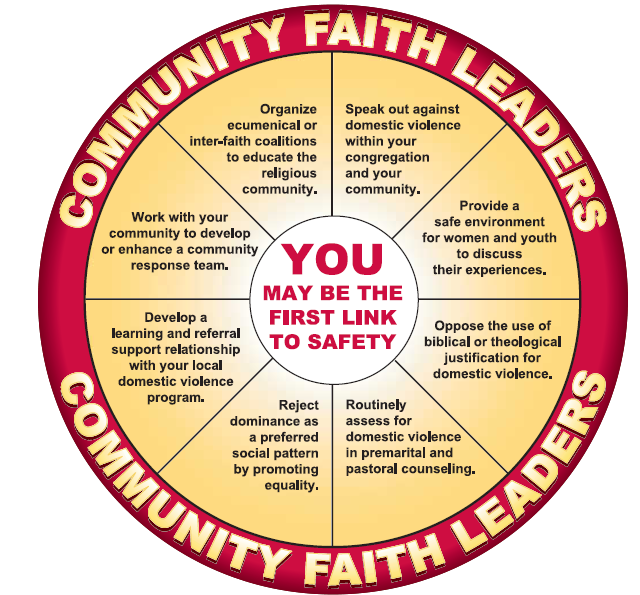Persons experiencing violence can call from any state 24-hrs/any day
The National Domestic Violence Hotline | 1-800-799 SAFE (7233) and TTY 800-787-3224
24 hours a day
The Virginia Domestic Violence Hotline Call 1.800.838.8238 (v/tty)
Domestic violence and abuse is a global concern for women with alarming rates but still it is rarely spoken of openly in most churches even as a minimal concern. That is changing now with our new outlook on the whole person – spirit, mind, and body. If the Church only addresses the spirit and not the mind and body that leaves a deficit in the person and the church as well.
Can you imagine seeing half of a person sitting on the pew in our church; like split down the middle and the other part missing? Would you think something was wrong and ask questions? Would you try to help the person find their other half? Of course you would. As believers in Jesus the Christ, we take on his nature to give hope, show love, and help individuals seek healing.
Years ago, there was a false belief that sticks and stones might break bones but words would never hurt anyone. The truth is that abuse can start with words, pushing, shoving, and slowly or quickly escalate to a pattern of physical and sexual acts that harm not only the body but the mind and spirit too. For the most part, adults know what abusive behaviors are. They can recognize them in others and sometime in themselves. The biggest challenge, even for believers sometimes, is to take a stand against abuse because they have not been taught how. Proverbs 11:18 says, “Rash language cuts and maims [wounds] but there is healing in the words of the wise (The Message).” It takes God’s wisdom to know how to heal wounds caused by harsh language and physical harm. The wrong words can harm but wise words and healing touch can bring about healing. Proverbs 4:7 says, “Wisdom is the principal thing; therefore get wisdom: and with all thy getting get understanding.” Training is quite critical to doing this type of ministry.
The Church has a unique calling to support those who are hurting in whatever way they experience pain and suffering. Domestic violence and abuse is a very personal experience and difficult for individuals and families to talk about even with the person they feel closest to, like their pastor. With God’s wisdom and knowledge and training on how to reach victims and survivors, we can help them take steps toward healing and restoration. Vincent Ministries will work toward equipping persons to address domestic violence and abuse as advocates and how to support victims and survivors while walking beside them on their journey to healing. Vincent Ministries will also be intentional about teaching young men how to treat young women with respect and care and not to use violence to get what they want.
Let’s share love toward victims and survivors first by sharing God’s love and gift of grace to let them know that we care. Then let’s position ourselves to attend learning opportunities to become equipped to wage war against domestic violence and abuse.
Ending Abusive Relationship
/
dynamics of VIOLENCE
One of the most commonly asked questions regarding domestic violence is “Why do women stay in abusive relationships?” It may be more appropriate, however, to examine the question “Why do men abuse the people they say they love?” Answers to these questions require an understanding of the phases of abusive behavior, the progression of violence, the use of power to attain control of a relationship, the effects of abuse, and societal forces that perpetuate an atmosphere conducive to abuse.
Phases of Abuse. In her work and interviews with victims, Lenore Walker (1979) discovered a definite battering cycle that victims experience. Below are the phases of Walker’s cycle.
Phase 1: Tension Building – Time where tension mounts and small outbursts occur. Victims feel like they must “walk on egg shells” so that the abuser will not explode.
Phase 2: Acute Battering Incident – Abuser decides to “teach her a lesson” by becoming physically abusive. Victim’s behavior cannot change the outcome. She feels helpless and depressed.
Phase 3: Kindness and Contrite Loving Behavior – Abuser asks for forgiveness and promises that the violence won’t happen again. He enlists other family and friends to plead his case. Victim wants to believe the promise and wants this to be the “real” person she loves. She may return or remain in the situation due to fear of what he will do if she leaves.
RESOURCES
View the EQUALITY WHEEL >
Developed by: Domestic Abuse Intervention Project

View the POWER AND CONTROL WHEEL >
Developed by: Domestic Abuse Intervention Project

View THE CYCLE OF VIOLENCE >
Office of the Kansas Attorney General – Jacqie Spradling, Domestic Violence Unit Director


